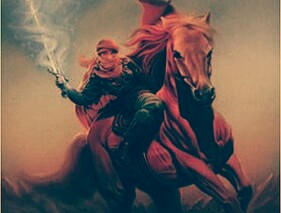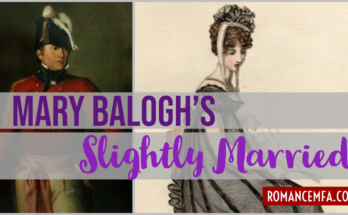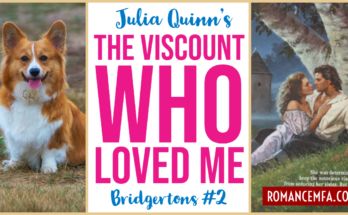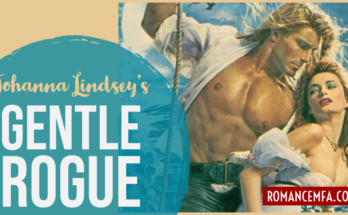I’ve unfortunately been ill yet again. This time I used my bedrest on The Blue Sword, an adolescent fantasy of a warrior woman who gets magical gifts, a great horse, and a marriage to a king.
Book details:
Title: The Blue Sword
Author: Robin McKinley
Original publication date: 1982
Setting time & place: Something very vaguely like the northern border of British Colonial India, after trains, before telegrams.
He is… a king ten years into his rule, forced by his magical Gift to kidnap our heroine to help save his country.
She is… a young “Homeland” woman, sent to the Darian colony after being orphaned, then a Lady Hero of the kingdom of Damar.
Reasons to read this title: A quick shot of nostalgia for feminist fantasy of the 1980s.
My review of The Blue Sword
Is it a romance novel? No. While it does contain a love story and some romance tropes, the focus is not on the protagonist’s emotional journey to fall in love.
Is it a must read romance novel? No, it’s pure nostalgia for a certain generation (mine).
I’ve been wanting to read The Blue Sword since I read EM Hull’s The Sheik and realized that both involved white ladies kidnapped by desert rulers. Was this childhood favorite of mine descended from Hull’s rape-mance? Although I read the book and drafted this post before I bothered to check, sources suggest McKinley rage-wrote The Blue Sword in just six months after reading The Sheik.
McKinley’s novel does have many similarities, at least at the beginning, with EM Hull’s story, previously discussed on this blog here. We have a young lady of European descent, in care of her brother. She is an excellent rider, wishes she could see the desert, and is warned she can’t act quite as usual in this new setting.
Harry’s brother Richard:
Finally, as if he could bear it no more, he burst out: “You won’t be able to go on as you did at home, you know.”
Diana’s brother Aubrey:
Though it has been convenient to me to bring you up as a boy and to regard you in the light of a younger brother instead of a sister, we cannot get away from the fact that you are a woman, and a very young woman. There are certain things a young woman cannot do.
Hull’s Diana starts her journey into the desert and is then captured by Sheik Ahmed; Harry is plucked from her bedroom in the middle of the night by King Corlath.
In both cases, the desert man has seen the heroine once and fixated upon her, taking careful premeditated action to carry off the abduction without hinderance or repercussion. Hull gives Diana the sense in her moonlit hotel room that someone is watching her; we later learn that Ahmed broke in to remove the bullets from her pistol and prevent her from defending herself. Harry, watching the moonlit desert from her window seat on the night Corlath comes for her, has the sense of shadows moving toward her.
Both women find themselves bundled and slung across the saddle unceremoniously. Diana is overpowered by Sheik Ahmed’s manly brute strength. Harry is doped by Corlath’s magic and equally unable to resist capture. As it’s a multiday ride, Harry gets a chance to reflect:
Am I about to be slung over the saddlebow like a sack of meal again? she thought. Is it more difficult to do the slinging when the sack in question is standing and looking at you?
After this point, the similarities become less exact but still notable. The tents which make up the hero’s home, for instance, are black and silver in Hull’s story, black and white in McKinley’s.
Inside Sheik Ahmed’s tent:
The somber hangings gleaming with thick silver threads seemed to Diana like a studied theatrical effect, a setting against which the Arab’s own white robes should contrast more vividly; she remembered the black and silver waistcloth she had seen swathed round him, with curling scornful lip. There was a strain of vanity in all natives, she generalised contemptuously. Doubtless it pleased this native’s conceit to carry out the colour scheme of his tent even in his clothes, and pose among the sable cushions of the luxurious divan to the admiration of his retainers.
Outside King Corlath’s tent:
the grandest tent of all. It was white, with two wide black stripes across its peak from opposite directions, meeting and crossing at the center, and extending to the ground like black ribbons. A black-and-white banner flew from the crossed center, the tallest point in the camp, as the tent was the biggest.
Although the inside of Corlath’s tent is much more colorful, such a color choice for his crest colors seems like a deliberate connection to Hull, especially as McKinley dresses her other characters in a rainbow of primary colors: blue robes, green sashes, yellow and brown and maroon. But Corlath’s tent is black and white and the king wears a white robe, albeit with a red sash.
Other similarities seem less deliberate and more a requirement of the sub-genre. To wit, the horses. If you’re writing a gloss of desert nomads, then horses are a pretty obvious inclusion. (Also camels, but they don’t seem as sexy to me. Sorry camels!) And if your heroine is a tomboy, then of course she rides. And if you’re a desert lord in love with said lady, then you give her a very nice horse.
If you’re Sheik Ahmed, you shoot the wonderful horse out from under the heroine whe she’s trying to escape from you. If you’re King Corlath, you sulk a little after you send the girl and the horse off for warrior training.
As a YA fantasy, the hero of The Blue Sword is a world–or at least several generations–away from the alphahole rapist in The Sheik. Despite being the king leading a war, and occasionally getting cranky, Corlath doesn’t come across as an alpha to me. This is probably because–and here we come to my biggest disillusionment with the book as an adult reader–he has very little agency as a character.
In McKinley’s world, a magic Gift, also called kelar drives the action of the book. It wasn’t Corlath who decided to kidnap Harry, it was the kelar. Corlath just had a big headache until he went along with it and then he was sorry for Harry after and tried to make up for it by being nice.
Corlath’s surprise was no less than that of his men as he heard himself say: “One last thing. I’m going back to the Outlander town. The girl—the girl with the yellow hair. She comes with us.
Then, later:
Long after Harry had cried herself to sleep again, the Hill-king lay awake, facing the grief he had caused and could not comfort.
But you know what? “A higher power told me to” is a shit excuse for shitty behavior, Corlath. Even if McKinley doesn’t have her heroine raped even once, even if Harry kinda wanted to run off into the desert anyway, nobody asked her in the moment and reading in 2018 I don’t know that I can give McKinley a pass on that. If you start with a problematic story and rework it, you’re probably still going to have a problematic story at the end.
Corlath isn’t the only character who suffers. The kelar robs Harry of her agency as well. There’s not a decision made by our heroine that isn’t attributed to the nudging, more or less subtle, of the kelar. In Hull’s story, Diana’s emotions, goals and desires are described or even over-described in overwrought purple prose. Harry, on the other hand, is a very passive character. Things are given to her and she takes them. She doesn’t have to think, dang, I wish I had a chance to ride a cool horse. They give her one. She doesn’t think I wish I understood this foreign language, but Corlath assigns her a teacher. She doesn’t wish for a sword, but she’s not unhappy when she’s given one.
She felt at once, wearily, that this was the way it was supposed to be held; and wondered if swordsmanship, like riding a war-stallion and speaking a language strange to her, was suddenly going to awaken in her blood like a disease.
Any time it seems like she might have an independent desire, McKinley throws in a line to make clear that it’s not Harry’s thought, it’s something that the kelar is pushing her towards.
When she is inspired to disobey her new king, for instance (emphasis added):
Only a few people were left when Harry stood up and faced Corlath and said, tiredly, as if she couldn’t help herself: “Why do you persist in ignoring the northwest pass? I cannot believe the Northerners may not give us an unwelcome surprise by its use.”
All of which went entirely over my head, I believe, as an adolescent reader who was just stoked that she got the horse, and a giant porridge-eating cat, and the king, and the opportunity to save the day.
Which brings me to the other problem with this book that is glaringly obvious in 2018 (but wasn’t a surprise on the reread). It’s a white savior story. Our white girl comes in and shows those brown people how she can be the bestest brown person ever. She gets a tan (but never burns WTF) and wins the trials for young warriors and crushes the bad guys and marries the king. Worse, for the second Damar book, McKinley made the whole country more European and the heroine is a feisty Irish redhead. (No, really, her name is Aerin. Maybe that didn’t feel like a cliche in 1987?) And remember how the surprise ending of The Sheik revealed that the barbarian Arab hero was actually European of English/Spanish parentage? McKinley flips this and we learn that Harry’s great-grandma was from the nobility of the kingdom she’s marrying into. See here for another rereader’s thoughts on that score, and here’s an essay on the colonial aspects of the story at Tor.com as well.
At the end of the day, I’m not sorry that I had this book as a part of my childhood. For me it was an extension of the Mythology of the Horse, because I was one of those girls, and the cover may have been what drew me to it in the first place. But rereading it has also made me think about how the childhood classics of previous generations don’t always need to be the classics of the next generation. I’m glad that McKinley updated Hull’s story to make it a rape-free adventure story for girls, but I’m ready for the next take on such a narrative. Maybe one written by someone who was born into a desert culture next time. Readers, writers, and stories keep evolving, and that’s a good thing.



